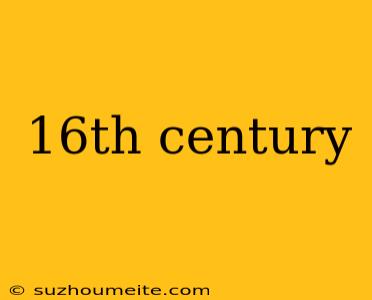The 16th Century: A Time of Great Change and Discovery
The 16th century, spanning from 1501 to 1600, was a transformative period in human history. It was an era of great cultural, artistic, scientific, and exploratory achievements that shaped the modern world. This century witnessed the rise of powerful empires, the emergence of new ideas and technologies, and the exploration of unknown lands.
The Renaissance and the Reformation
The 16th century saw the continuation of the Renaissance, a cultural and intellectual movement that began in Italy in the 14th century. This movement was characterized by a revival of interest in classical Greek and Roman culture, as well as a focus on humanism and individualism. Artists, writers, and thinkers such as Leonardo da Vinci, Michelangelo, and Galileo Galilei made significant contributions to the fields of art, literature, and science.
Meanwhile, the Protestant Reformation, led by figures like Martin Luther and John Calvin, challenged the authority of the Roman Catholic Church and led to the establishment of new Christian denominations. This period of religious turmoil and upheaval had a profound impact on European society and politics.
Age of Exploration
The 16th century was also a time of great geographical exploration and discovery. European explorers like Vasco da Gama, Ferdinand Magellan, and Christopher Columbus embarked on voyages of discovery, establishing trade routes and colonizing new lands. The discovery of the New World, particularly the Americas, had a profound impact on global politics, economy, and culture.
Science and Technology
The 16th century saw significant advances in science and technology. The invention of the printing press by Johannes Gutenberg in the 15th century revolutionized knowledge sharing and literacy. The development of new navigational tools and techniques, such as the astrolabe and the quadrant, facilitated maritime exploration and trade.
Notable Figures
Some notable figures of the 16th century include:
- Leonardo da Vinci: An Italian polymath and Renaissance master, known for his iconic works such as the Mona Lisa and The Last Supper.
- William Shakespeare: An English playwright and poet, widely regarded as one of the greatest writers in the English language.
- Martin Luther: A German theologian and reformer, who led the Protestant Reformation and challenged the authority of the Roman Catholic Church.
- Ferdinand Magellan: A Portuguese explorer, who led the first expedition to circumnavigate the globe.
Conclusion
The 16th century was a time of great change, discovery, and achievement. It laid the foundations for the modern world, shaping the course of history, culture, and science. The innovations, ideas, and explorations of this century continue to influence us today, making it a fascinating and important period to study and appreciate.
